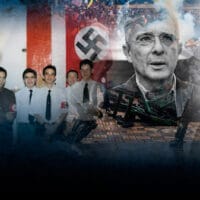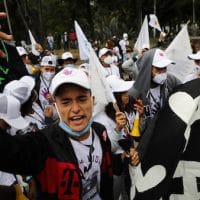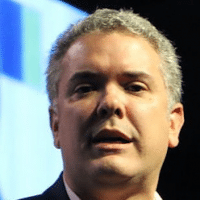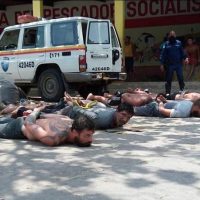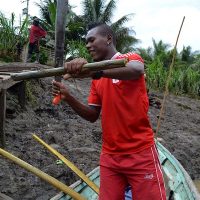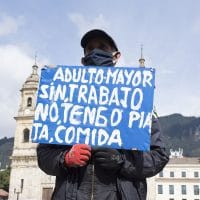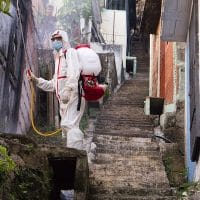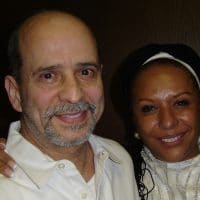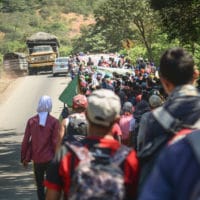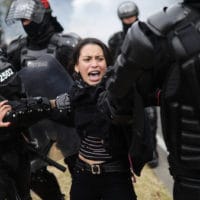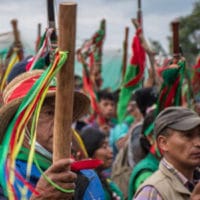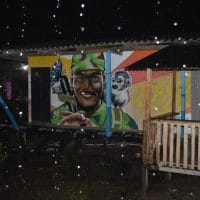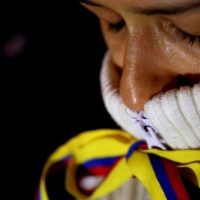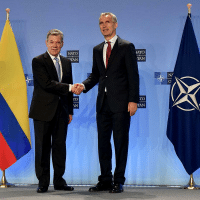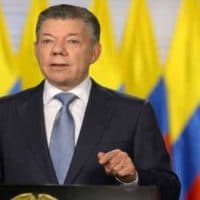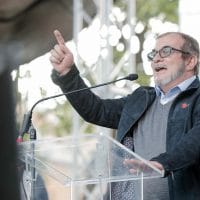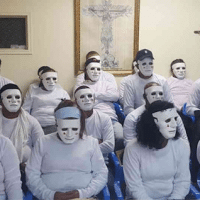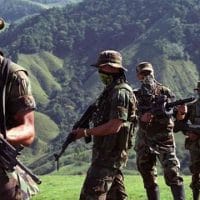-
Meet the Neo-Nazi advising Colombian police on how to break the National Strike
Behind The Headlines’ Dan Cohen examines the ongoing national strike in Colombia and how President Duque is relying on a neo-fascist ideology to subdue it.
-
Fingers point to U.S.-backed Gov’t in Colombia’s ninetieth massacre of the Year
“The Trump administration waged a full scale campaign to undermine Colombia’s peace accords. We must not waste our time hoping the Biden administration might reverse course, we must demand it.” — James Jordan, Alliance for Global Justice
-
Colombia’s President shows his disdain for democracy and Venezuelans
On December 8, a Conviasa flight prepared to take off from Caracas, Venezuela, for Mexico City. It planned to carry 200 election observers and journalists who came to Venezuela from a range of countries to monitor the National Assembly elections that were held on December 6.
-
The nonexistent peace in Colombia
Class struggle in Colombia will escalate as the hopes of the peace deal are continuously shattered by the blood and gore of political killings. Without any material policies, the guarantees of the Peace Agreement have turned out to be hollow.
-
The tragic assassination of Colombia’s sports hero Patrón, lover of football and his Afro-Colombian community
Patrón lived in Chocó in northwestern Colombia, where 96 percent of the people identify as Afro-Colombian or as part of the Emberá Indigenous community. Chocó is treated as a backwater of the country, with no real infrastructure in the province’s expanse and little social policy to enhance the lives of its population.
-
The hunger pandemic in Colombia
The unchecked growth of the COVID-19 pandemic in Latin America is tearing apart the socio-economic fabric of the countrieslocated in that continent.
-
Venezuela’s borderlands have been assaulted by COVID-19
Venezuela’s rate of infection remains low, despite the U.S. unilateral sanctions that have denied the country the right to import drugs and tests for the population.
-
U.S. must return its political prisoner Simón Trinidad to Colombia
Simón Trinidad matters; his time has come. This leader of the former Revolutionary Armed Forces of Colombia (FARC) faced bizarre and unfounded criminal charges in a U.S. court. He’s being held under the cruelest of conditions in a federal prison in Florence, Colorado. He will die there unless he is released. Simón Trinidad will be 70 years old on July 30.
-
Colombia’s government acts like a doormat for the United States—and its people aren’t going along with it
With the U.S. government now absurdly saying that Venezuela is the source of narco-trafficking, even though all evidence pointing to narco-trafficking is rooted in Colombia, the pressure on Colombia to deal with its drug problem is now lifted.
-
As media amplifies unrest in Venezuela and beyond, millions are quietly revolting in Colombia
Despite protests of historic proportions fueled by anger over corruption and a brutal right-wing crackdown, the unrest in Colombia has garnered remarkably little international media attention compared to Venezuela.
-
The people of Colombia are cracking up the walls of war and authoritarianism
The protests that started with the national strike called by Colombia’s central union on November 21 to protest pension reforms and the broken promises of the peace accords have persisted for two months and grown into a protest against the whole establishment. And the protests have continued into the new year and show no signs of stopping.
-
Dossier 23: Peace, neoliberalism and political shifts in Colombia
Once again, the people of Colombia straddle two realities–the drums of war and the hope of peace. This tension has along, complex, and multi-dimensional historical process. This dossier from Tricontinental: Institute for Social Research examines the root causes of the crisis and the two realities of war and peace.
-
Dossier 14: Brazil’s Amazon—the wealth of the earth generates the poverty of humankind
The destruction of the Amazon has serious consequences not only for Brazil, but for all of Latin America—and the world.
-
The fragility of the Colombian peace accords and the reincorporation of ex-insurgents of the FARC-EP
In this article we discuss the (non-) implementation of the Colombian peace accords, based on a conference given by Victoria Sandino, a leading FARC figure. We also examine an initiative, Ecomun, to build peace through the construction of alternative economies in the Colombian countryside.
-
Colombia’s peace crumbles as social leaders killed with impunity
“In a country subsumed in terror and violence, it is easier to subdue the population and enslave them to work in favor of big capital.” (Camilo Bonilla, 2018)
-
Colombia’s NATO membership about more than just Venezuela
Faced with questions about the continued relevance of the North Atlantic alliance, NATO has sought justification for its existence from Central Asia to Sub-Saharan Africa and has even floated the idea of indirect intervention in the South China Sea dispute.
-
Santos announces that Colombia will join NATO
For the first time in history, a Latin American country will be part of the North Atlantic Treaty Organization.
-
Leader of the former FARC guerrillas to run for President of Colombia
Last Sunday, January 27, the Alternative Revolutionary Force of the Common (FARC), which is the political party formed by the Revolutionary Armed Forces of Colombia—People’s Army (FARC-EP) guerrillas, launched the presidential candidacy of Rodrigo Londoño, alias Timochenko, setting a new cornerstone in the political history of Colombia.
-
“Social leaders are murdered because of fights over women”, said Colombia’s Defense Minister
Just a week ago, Colombian social leaders denouncing the murder of another one showed up to the press conference with masks covering their faces in order to avoid risking to lose their own lives—such is the danger of defending human rights in Colombia.
-
“Colombia is safe for business, but not for people”
Murders of trade unionists and social leaders, paramilitary activity, coca production… If we only paid attention to the mainstream media we would not get the idea that these problems are actually growing in Colombia, one year after the peace agreement between the Colombian government and the FARC came into place. To get a better picture and understand how all these elements connect to US policy and corporate interests, we interviewed Daniel Kovalik, a lawyer and human rights activist who has long been involved in the struggle for peace and justice in Colombia.

